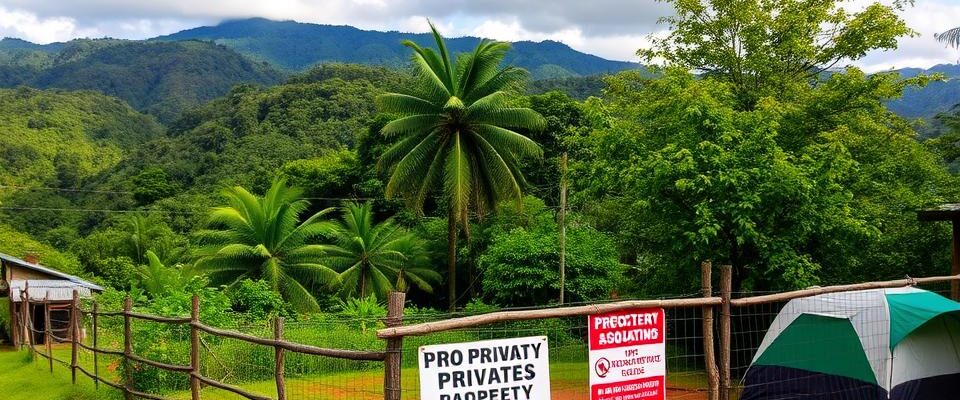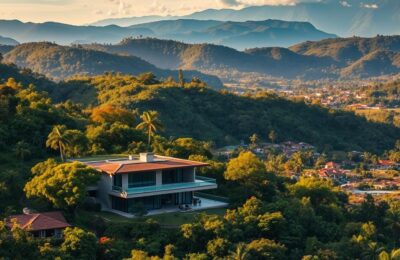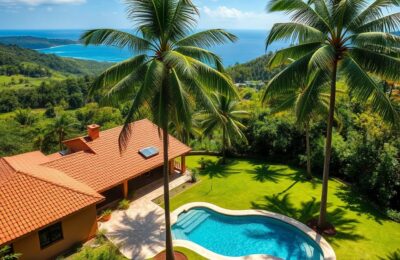Squatters Rights in Costa Rica: What You Need to Know
Ever thought about how long you could lose your property to squatters before the law steps in? It’s crucial to know about squatters’ rights in Costa Rica, especially for property owners and those looking to buy. The laws on land occupation can lead to tricky disputes over property ownership. Knowing about Costa Rica’s squatter laws and the rights they claim can protect your investment and ensure you follow the law.
In Costa Rica, you can gain rights to a property by just living there for over a year. If you don’t act against squatters in the first three months, you could make things worse. They might ask for money for any improvements they made to your property. This shows why it’s key to understand Costa Rica’s squatter laws and act early to avoid problems.
This article will give you all the details you need to know about squatters’ rights. It will guide you on how to handle land occupation and protect your property rights.
Key Takeaways
- Property owners must act within three months to assert their rights against squatters.
- Squatters can acquire full ownership of a property after ten years of possession.
- Legal knowledge is vital for avoiding property ownership disputes.
- Good faith use and length of occupation significantly affect squatters’ rights.
- Proactive property management prevents vulnerabilities to squatting.
Understanding the Legal Framework Surrounding Land Occupation
In Costa Rica, the laws about land occupation are complex. They cover both property owners and squatters. These laws have rules that people need to know to avoid legal issues.
A key part of these laws is the three-year “incubation period” for new property titles. This means others can question the title during this time. It shows how crucial it is to check the property’s history before buying it.
To get a title for land, you need to show it has been in your possession for ten years without any disputes. This process can take a year and cost between $1,500 to $3,000, depending on the land size. Coastal properties also have special laws, like the Maritime Zone law. This law says the state owns a 200-meter strip along the coast. It’s managed by the local government and the Costa Rican Tourist Institute.
Over 800 rights have been transferred in this zone, showing it’s a busy market. Under these laws, people living on land without the right to it can gain rights if they occupy it in good faith for a long time. It’s important to know these laws if you’re thinking about buying property in Costa Rica.
Squatters Rights in Costa Rica
In Costa Rica, understanding the legal rights of squatters means looking at the rules for living on land without owning it. These rules set out what people need to do to claim land they live on as their own.
Conditions for Acquiring Rights
To get legal rights, squatters must do a few things:
- Live on the property without a break for at least ten years.
- Show they use the land in good faith, meaning they use it as they should.
- Follow the rules set by local authorities, making sure they don’t take away the rights of the true owner.
Squatters must prove they’ve lived there for a long time and used the land right. If they don’t meet these rules, they can’t claim the land as their own.
Length of Occupation and Good Faith Use
How long someone has lived on the land is key to their legal rights. They must stay for at least ten years to show they’re serious. Also, they must use the land well, taking care of it and not harming others around it.
If they do these things, they can ask the court to recognize their rights to the land in Costa Rica.
Overview of Land Occupation Laws in Costa Rica
In Costa Rica, laws set clear rules for land use and rights. These rules help both property owners and squatters know their place. It’s crucial for property owners to follow these laws closely. If they don’t, they could face big problems with their land.
Squatters can legally claim land after living there for ten years, if they use it honestly. This system gives stability to those living in uncertain housing situations. Both squatters and property owners need to know their rights and duties to avoid land disputes.
Tenants have strong protections in rental laws, like staying in a place for up to three years without being kicked out. Landlords also have rules to follow, like how much they can raise rent and keeping the property in good shape. These rules help keep a balance between landlords and tenants, making housing fair and respectful.
Property Rights and Land Ownership in Costa Rica
Knowing about property rights is key for anyone looking into real estate in Costa Rica. The laws on land ownership offer different types of rights and duties. It’s important to understand these to solve land disputes in Costa Rica.
Types of Land Ownership
Costa Rica has several types of land ownership, including:
- Fee Simple: This type gives the owner full control over the land. They can sell, lease, or improve it as they like.
- Concession: This is often for public land. It gives the right to use the land for a certain time, with government oversight.
- Possession: You can claim land by occupying it peacefully for ten years. After that, you might get legal rights to it.
Legal Mechanisms for Resolving Property Disputes
Disputes over property in Costa Rica can happen for many reasons, like squatters’ rights. There are legal ways to solve these issues, such as:
- Negotiation: This is often the first step. Parties try to agree without going to court.
- Mediation: A neutral person helps the sides talk and negotiate.
- Litigation: If other ways don’t work, disputes can go to court. This can take a long time.
Knowing these options helps property owners and others with rights to make good choices in disputes. Being active in the legal process is often best for keeping property rights in Costa Rica safe.
The Squatter Eviction Process in Costa Rica
Knowing how to handle squatter evictions in Costa Rica is key for property owners. It’s important to follow the legal steps to get your property back. The time it takes to evict squatters depends on how long they’ve been there and the legal steps needed.
Initial Steps for Evicting Squatters
The first step is to give written notice to the squatters. If they don’t leave, you must file an eviction complaint with the court. This works best if they’ve been there for less than three months, avoiding a long court process.
Legal Procedures and Requirements
After three months, evicting squatters gets harder. You’ll need to file complaints for trespass and administrative eviction. If they’ve been there over a year, you’ll need more legal action. You must show proof of ownership and follow Costa Rican laws.
Long-term squatters might ask for money for improvements they made. This makes evicting them harder. For help with property listings and protection against squatting, contact GAP Real Estate. Knowing the legal steps helps you manage your property well.
Tips for Property Owners on Protecting Land from Squatters
Property owners in Costa Rica often struggle to keep their land safe from squatters. Regular checks on the property are key to avoiding these issues. Keeping the property in good shape not only raises its value but also scares off potential squatters. It’s also vital to have up-to-date documents that prove you own the land legally.
Having caretakers look after the property every day can greatly lower the chance of squatting. They keep an eye on the property, keep it in good shape, and act fast if they see anything odd. Owners who are away from their property are more at risk. Costa Rica’s squatting laws say they could lose their land if they don’t protect it properly.
- Pay property taxes on time.
- Maintain a fenced perimeter around the property.
- Regularly clean and inspect the premises.
- Install webcams for 24/7 monitoring.
Working with local real estate experts can give you great advice on dealing with squatters in Costa Rica. These experts can help, especially if you’re new to the legal side of things. Being proactive not only protects your ownership but also makes managing your property easier, giving you peace of mind.
Navigating Complications: Common Challenges with Squatters
Dealing with land disputes in Costa Rica can be tough for property owners facing squatters. The country’s laws give certain rights to those living on the land, leading to long-term problems for rightful owners. It’s crucial to know the laws and regulations about evictions and ownership claims.
Legal Hurdles for Property Owners
When trying to solve land disputes in Costa Rica, property owners face many legal challenges. These include:
- Restrictions on quickly evicting squatters, which can make getting back property take longer.
- Possession rights that let squatters claim the land after living there for ten to twenty years.
- Delays in court cases due to too many cases or complex paperwork.
- The need for property owners to do detailed research, taking 30 to 60 days, to prove they own the land.
It’s important for property owners to understand Costa Rica’s laws to tackle these issues. This helps them protect their property rights.
Conclusion
In Costa Rica, the rules on property ownership laws and squatters rights are complex. Squatters can gain legal rights after just 90 days of living there without interruption. They can then apply for a title after ten years. It’s vital to know how squatters’ rights work in Costa Rica, as landowners face a system that lets these rights stand.
To fight against squatting, property owners should act early. They should keep their property in good shape, pay taxes on time, put up fences, and hire caretakers. Getting legal advice is also key. It helps both property owners and squatters know their rights and how to solve conflicts.
With more organized squatter groups and tricky land ownership issues, staying updated is essential. Everyone involved must be careful and take steps to protect their property. This way, they can deal with squatters and keep their property rights safe in Costa Rica.
Source Links
- https://www.costarica.com/real-estate/squatters-rights
- https://www.remax-oceansurf-cr.com/squatters-rights-and-long-term-renters-costa-rica
- https://crie.cr/about-costa-rica-squatters-rights/
- https://caribesurrealestate.com/guide-to-buying-and-owning/
- https://www.costaricaguide.co.cr/real-estate/buying-process/property-rights-foreign-investment.html
- https://costaricapropertymanagement.net/costa-rica-real-estate-an-investor-overview-for-2024/
- https://www.godutchrealty.blog/costa-rica-real-estate-info/squatter-rights-in-costa-rica-how-to-stop-it-from-happening/
- https://crie.cr/squatters-rights-in-costa-rica/
- http://guidetocostaricarealestate.com/christopher-howards-guide-to-real-estate-in-costa-rica/christopher-howards-guide-to-real-estate-in-costa-rica/chapter-11-legal-matters/property-rights
- https://www.anywhere.com/costa-rica/travel-guide/sustainable-development
- https://www.costaricaguide.co.cr/real-estate/buying-process/protecting-property-rights.html
- https://news.co.cr/squatters-rights-in-costa-rica-explained/61791/
- https://www.welovecostarica.com/costa-rica-land-squatters-have-rights-too/
- https://crie.cr/do-squatters-have-rights-in-costa-rica/
- https://www.gapequityloans.com/en/protect-your-property/
- https://www.larepublica.net/noticia/a-practical-guide-for-property-buyers-in-costa-rica
- https://www.lincolninst.edu/app/uploads/2024/04/2446_1792_Calderon_WP14JC4.pdf
- https://costaricacanadalaw.com/2020/09/25/what-are-squatters-rights-in-costa-rica/
- https://livingcostarica.com/costa-rica-real-estate-topics/how-to-protect-your-costa-rica-property-rights/
- https://www.gaprealestate.com/about-squatters-rights-costa-rica/




